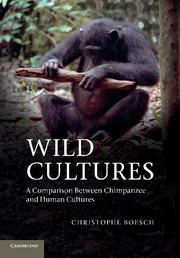Book contents
- Frontmatter
- Contents
- Acknowledgments
- Introduction
- 1 Studying culture in the wild
- 2 From human culture to wild culture
- 3 Shaping nature into home
- 4 One for all and all for one
- 5 I want to have sex with you
- 6 Learning culture
- 7 Dead or alive? Towards a notion of death and empathy
- 8 Wild culture – wild intelligence
- 9 Uniquely chimpanzee – uniquely human
- Epilogue: Will we have the time to study chimpanzee culture?
- References
- Index
8 - Wild culture – wild intelligence
cognition and culture
Published online by Cambridge University Press: 05 October 2012
- Frontmatter
- Contents
- Acknowledgments
- Introduction
- 1 Studying culture in the wild
- 2 From human culture to wild culture
- 3 Shaping nature into home
- 4 One for all and all for one
- 5 I want to have sex with you
- 6 Learning culture
- 7 Dead or alive? Towards a notion of death and empathy
- 8 Wild culture – wild intelligence
- 9 Uniquely chimpanzee – uniquely human
- Epilogue: Will we have the time to study chimpanzee culture?
- References
- Index
Summary
If one were to order all mankind to choose the best set of rules in the world, each group would, after due consideration, choose its own customs; each group regards its own as being the best by far.
Herodotus, The Histories (p. 185).Our climb to the top has been a get-rich-quick story, and, like all nouveaux riches, we are very sensitive about our background.
Desmond Morris, The Naked Ape (1967).Loango National Park, Gabon, 15 October 2009 (extract from a video sequence)
Ida, an adult female from the Rekambo community, arrives at an underground nest of Melipone sweat bees that, judging by its state, had initially been discovered by elephants and where we had also seen another chimpanzee trying in vain to get at the honey. Without any hesitation, Ida goes towards a sapling that is 5 m from the nest entrance, stands upright to seize the sapling, bends it towards her and breaks it 1 m above the ground. Then turning the branch upside down, she uses her teeth to break off a 120-cm long stick. She then goes towards the nest and inserts the thinner end of the tool into the ground. Holding the stick with her left foot and right hand while steadying herself with her left hand at the base of another sapling, she uses all her strength to insert the stick 50 cm into the soil, all while her 4-year-old son watches closely nearby. She pulls out the stick and smells the tip, then pushes it back deeper into the soil. Once the tip of the stick becomes too bent from this heavy use, Ida breaks it off with her hand. Two minutes later, she makes a second longer tool from a sapling 10 m away and uses this one to dig deeper. After working like this for more than 4 minutes, she reaches the top of the honey chamber about 70 cm under the surface. She starts licking the tip of the stick and removes the loose earth around the hole with her right hand. Alternating between removing earth with her hand and digging with her stick, Ida eventually pulls out her honey covered hand 3 minutes later. Her son immediately puts his hand into the hole as well and both feed on this delicacy for 15 minutes.
- Type
- Chapter
- Information
- Wild CulturesA Comparison between Chimpanzee and Human Cultures, pp. 176 - 214Publisher: Cambridge University PressPrint publication year: 2012



